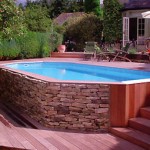Will Adding A Pool To Your Home Increase The Value By More Or Less Than The Cost?
1 Comment There is one thing that comes up again and again during home appraisals: Does adding a pool raise a home’s value by more or less than the cost to build it?
There is one thing that comes up again and again during home appraisals: Does adding a pool raise a home’s value by more or less than the cost to build it?
Home swimming pools come in a variety of shapes and sizes and are worth more to some buyers than others — so there aren’t always hard numbers to quantify how much money a pool is worth. For example, in ground pools are valued higher than above ground pools, a family with children may want a pool and a family without may not.
Ultimately, The Best Way To Find Out If Adding A Pool To Your Home Will Increase The Value…
By more or less than the cost to install the pool is to get to appraisals. One appraisal of your home without the pool and then have the appraiser do another appraisal as if your home has a pool and see the difference in appraised value. This is because the appraiser will select one set of comparable sales to use in the report of your home if it does not have a pool to come up with the value and use another set of comparable sales if your home does have a pool to come up with the value. We do this for clients and offer a discount for the second appraisal.
It mostly depends on your neighborhood and the current market conditions at the time of the appraisal to determine if your a pool will add more or less value than the cost to install.
Installation of a pool may cost the home-owner around $20,000 but a real estate appraisal may put the pool’s added value to the home at $10,000, $20,000 or $40,000.
Why do appraisers give a pool less, equal or more value than it’s cost? An appraiser’s job is too interpret what the market says. The real estate appraiser looks at closed sale prices of homes and determines if homes with pools sell for more or less than homes without pools. Every neighborhood is different.
During a home appraisal, the pool’s worth can be determined by the type of construction of the pool. Whether it is above or below ground does make a difference. Also, the climate at the location matters as well. So, in South Carolina the climate is warm for a good part of the year, thus many families in middle to upper class neighborhoods prefer a home with a pool to cool down during the warm months and are willing to pay a premium for this amenity. Lower end neighborhoods may not want the added expense of maintaining a pool.
The appraiser should do a paired sales analysis of at least two separate pairs of homes with each pair of homes being similar in all aspects to each other accept that one has a pool and one does not. By comparing these homes to each other the appraiser can see how much extra, the same or even less buyers are willing to pay for the house with a pool.
Tags: above ground pool, above ground pools, appraisal, appraisal sale, below ground pools, bewlo ground pool, home appraisal, home appraiser, home sale, home swimming pool, home value, home value pool, house pool value, installation pool, pool appraisal, pool home appraisal, pool install, pools, property appraisal, real estate appraisal, swimming pool home, swimming pools, what is an appraisalCategorised in: Appraisal Tutorials & Info
This post was written by Joseph Castaneda


1 Comment
My philosophy is that you should only add a pool to your home if you live in a neighborhood where people are wealthy enough to hire someone to take care of it. Because for anyone who can’t afford to do that (or simply doesn’t want to do that) it’s just another liability, another thing around their property that they’ll have to maintain.